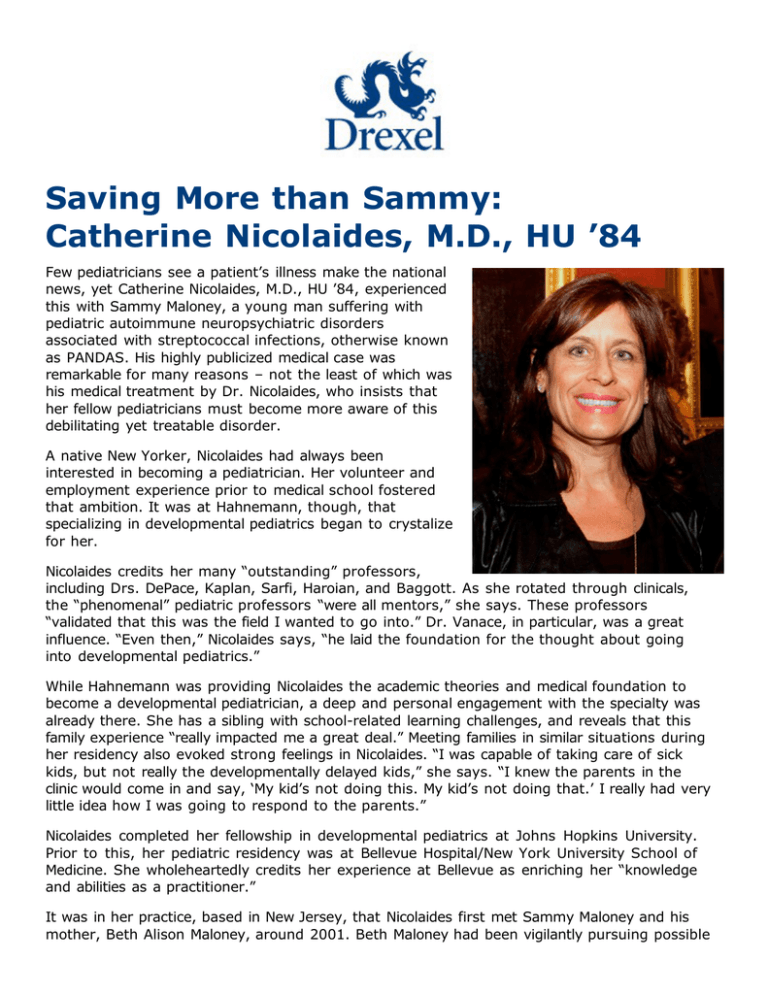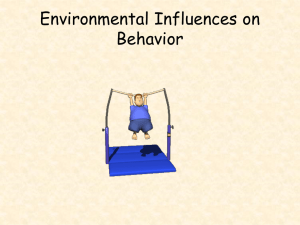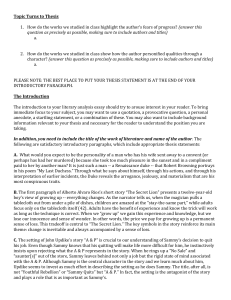
Saving More than Sammy:
Catherine Nicolaides, M.D., HU ’84
Few pediatricians see a patient’s illness make the national
news, yet Catherine Nicolaides, M.D., HU ’84, experienced
this with Sammy Maloney, a young man suffering with
pediatric autoimmune neuropsychiatric disorders
associated with streptococcal infections, otherwise known
as PANDAS. His highly publicized medical case was
remarkable for many reasons – not the least of which was
his medical treatment by Dr. Nicolaides, who insists that
her fellow pediatricians must become more aware of this
debilitating yet treatable disorder.
A native New Yorker, Nicolaides had always been
interested in becoming a pediatrician. Her volunteer and
employment experience prior to medical school fostered
that ambition. It was at Hahnemann, though, that
specializing in developmental pediatrics began to crystalize
for her.
Nicolaides credits her many “outstanding” professors,
including Drs. DePace, Kaplan, Sarfi, Haroian, and Baggott. As she rotated through clinicals,
the “phenomenal” pediatric professors “were all mentors,” she says. These professors
“validated that this was the field I wanted to go into.” Dr. Vanace, in particular, was a great
influence. “Even then,” Nicolaides says, “he laid the foundation for the thought about going
into developmental pediatrics.”
While Hahnemann was providing Nicolaides the academic theories and medical foundation to
become a developmental pediatrician, a deep and personal engagement with the specialty was
already there. She has a sibling with school-related learning challenges, and reveals that this
family experience “really impacted me a great deal.” Meeting families in similar situations during
her residency also evoked strong feelings in Nicolaides. “I was capable of taking care of sick
kids, but not really the developmentally delayed kids,” she says. “I knew the parents in the
clinic would come in and say, ‘My kid’s not doing this. My kid’s not doing that.’ I really had very
little idea how I was going to respond to the parents.”
Nicolaides completed her fellowship in developmental pediatrics at Johns Hopkins University.
Prior to this, her pediatric residency was at Bellevue Hospital/New York University School of
Medicine. She wholeheartedly credits her experience at Bellevue as enriching her “knowledge
and abilities as a practitioner.”
It was in her practice, based in New Jersey, that Nicolaides first met Sammy Maloney and his
mother, Beth Alison Maloney, around 2001. Beth Maloney had been vigilantly pursuing possible
medical leads in the hope of diagnosing and treating her son, an otherwise healthy 12-year-old
who had become debilitated overnight. Sammy’s grandmother had heard of Nicolaides’ work
with the PANDAS disorder, and suggested the family make an appointment.
For Sammy, even leaving his house for the appointment was torture. “By the time I saw
[Sammy],” Nicolaides says, “his symptoms were so significant and so severe that he couldn’t
even really get out of the van to come in to the office. From the office to the exam room was a
pretty significant struggle. The struggle was in the compulsive behavior that he engaged in.”
Sammy walked with eyes closed and a shuffling gait. He would not touch or step on certain
things; instead, Nicolaides recalls that he was “raising his legs and thrusting them over what
were invisible lines that he perceived to be coming out of electric sockets.”
These symptoms had literally developed overnight. Previously, Sammy “was a young man who
really excelled academically, specifically in math, and was a well child,” Nicolaides relates.
“Overnight he became really debilitated with severe obsessive-compulsive symptomatology.
Overnight he was just not functioning.” Doctors recommended he seek permanent at-home
care.
No physician had been able to help Sammy. He had been diagnosed with obsessive-compulsive
disorder, then Tourette’s syndrome. Neither diagnosis – nor treatment – was correct. Maloney,
through her own ceaseless investigations, had learned that Sammy’s problems might be
related to an untreated strep infection. Most of the medical community ignored this possibility.
Nicolaides says, “I have to commend [Sammy's] mother. She was relentless. The journal she kept
in terms of his illness really helped treatment significantly. Without her being such a great notetaker, I don’t know that we would have been as successful as we were.”
Because of Maloney’s evidence, Nicolaides ultimately treated Sammy for PANDAS. Today he is
healthy. He is a college student.
It is to Nicolaides’ credit as a physician and as an individual that she listened to the Maloney
family and accompanied them on their medical journey.
PANDAS, however, is considered controversial in the medical community. Much of the
controversy is simply because PANDAS is a new diagnosis. Also, because the diagnosis is new,
the patient population thought to have PANDAS has not been well studied. It is, therefore, a
challenge to potentially diagnose someone with PANDAS, because the pathology is not well
documented. Complicating matters is the presentation of symptoms similar to OCD and
Tourette’s. Nicolaides explains, “To distinguish [among diagnoses], or say that one is different
from the other, or there’s this subpopulation that may present differently, or subpopulation
that responds to different forms of treatment, is sort of a new finding. It hasn’t been well
studied yet to establish that there may be two populations or a different etiology to the
causes.”
It is thought that PANDAS may originate in an untreated, wrongly treated, or undiagnosed
strep infection. For a small population, strep antibodies begin to attack the brain. Nicolaides
compares this to rheumatic fever, observing, “The body now develops these antibodies against
the strep which then confuse – and may attack – areas of the brain which produce these
symptoms, specifically in the basal ganglia.” Nicolaides stresses that pediatricians – those “on
the front line” – must be educated about the disorder. “By the time [patients] get to the
psychiatrist with significant OCD symptoms, they may have already had symptoms for a while.
We want it right when they present to the pediatrician.”
Sammy’s case is unique in that it has been highly publicized, but Dr. Nicolaides continues to
see children in her practice who are not well-known, yet whose health and mental well-being are
just as important.
Nicolaides appreciates that she was able to establish her private practice when her own children
were young, and so she was able to have flexibility in her schedule and be more available to
them. Despite the time and intensity required by her practice, she says, “I always had [family]
dinner. We always sat down for dinner.”
Today her college-age children are pursuing their own vocations. Her son has been accepted to
and will soon be attending the College of Medicine. “Drexel now is doing a phenomenal job,”
Nicolaides says, applauding both the College’s rich history and its current vision.
© Copyright 2013 - Drexel - All Rights Reserved.






